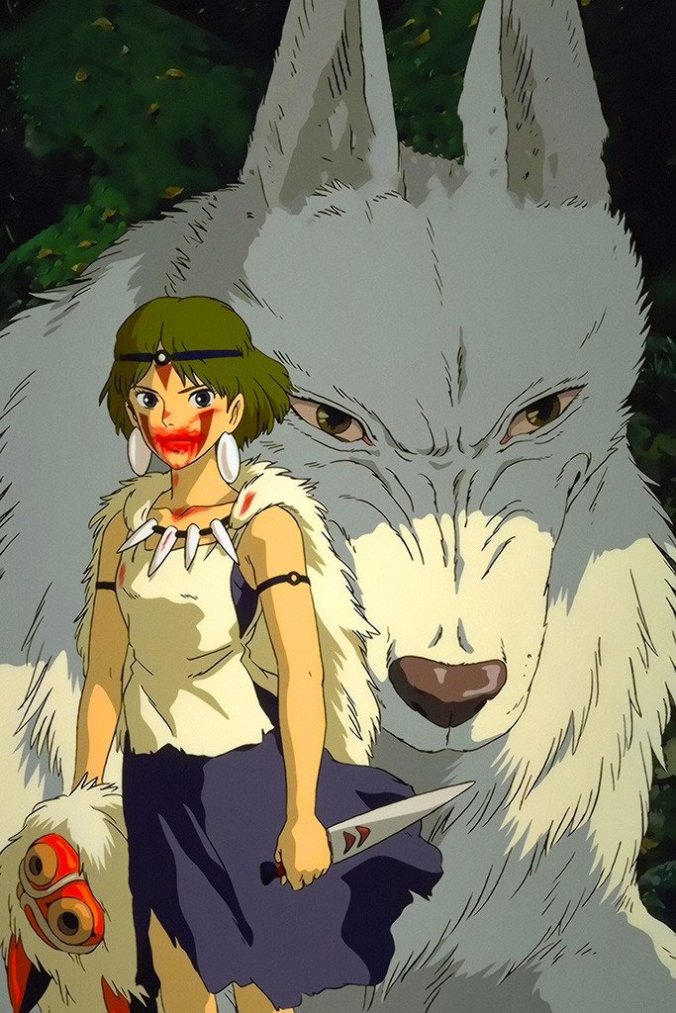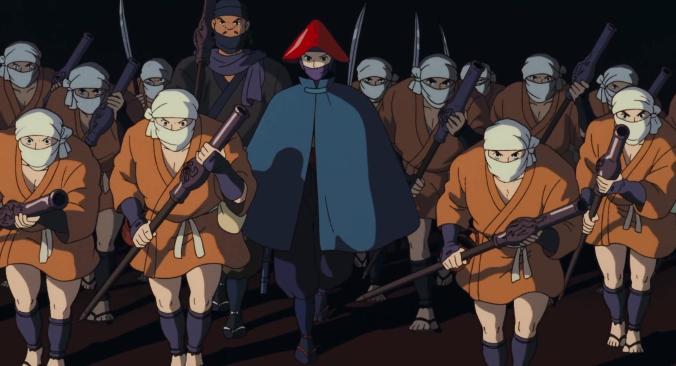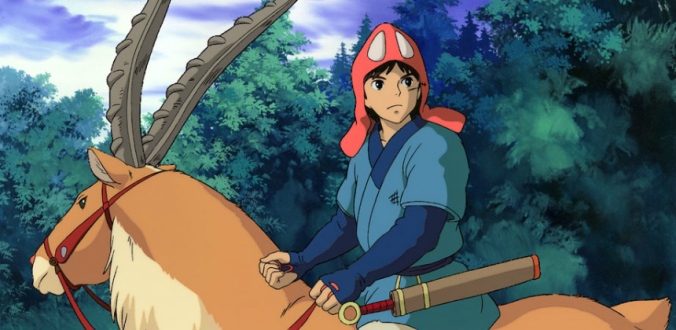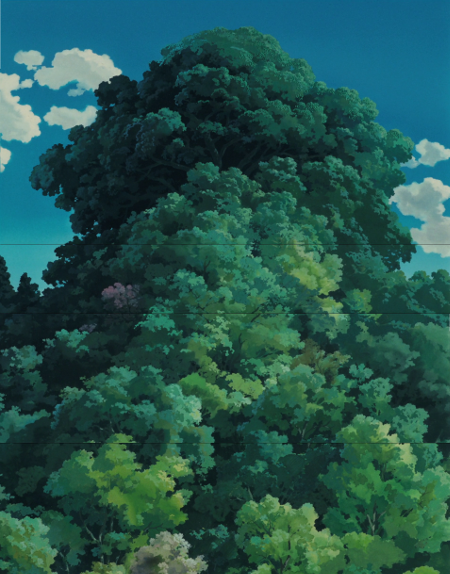
heck yeah
A few nights ago I rewatched Princess Mononoke for the twentieth time or so and you guys it’s so damn good. This is, of course, not an original observation. Mononoke is probably one of Miyazaki’s best-regarded films, well recognized as a masterpiece. It’s a towering work of epic fantasy, painting a gorgeous picture of a semi-mythic past while telling a story that remains as relevant and thought-provoking as ever. The animation is breathtaking, the music is gorgeous. It is one of my all-time favorite movies and I want to talk about why.
In my piece on Nausicaä of the Valley of the Wind I wrote that the movie “blends environmentalism, pacifism, and feminism together more seamlessly then perhaps any of Miyazaki’s movies, with the possible exception of Princess Mononoke.” I stand by that! Mononoke handles environmentalism with the same nuance and dexterity that makes Nausicaä so great. The movie takes place at the turning point, the epochal pivot of ages. As the Age of Gods ends and the Age of Man begins, men have arrived at the sacred forest of the Old Gods, the home of the Spirit of the Forest, and are now locked in mortal conflict with the protectors of the woods.
The conflict between Man and the Forest is fought not because mankind is evil or because greedy villains wish to despoil the natural world for the sake of destruction, it is fought because people have legitimate desires that come into conflict with nature. Negotiating a true balance, a peace, between the two worlds is possible, and necessary, but it must be done by taking both side’s needs into account. The people of Irontown are leveling the forest to get at the iron ore beneath the rock; burning trees, slaughtering animals, and plotting to slay the Old Gods of the Forest themselves. But the movie portrays them very sympathetically. They’re ordinary people, trying to make a living for themselves in a cruel and unforgiving world, living in terror of the primordial beasts of the forest who strike without warning and who are resistant to their weapons.
In a movie such as this, we’d usually be expected to sympathize with the Forest Gods. And we do. By and large, their cause is shown as no less just than that of the humans. Their rage at the hairless monkeys who are destroying their homes is portrayed as righteous, legitimate, and correct. But it would be a mistake to describe them as good. They are Gods, old, deep, and having very interest in the affairs of mortals. Our protagonist is Prince Ashitaka, a journeyer from the Far East who was cursed after slaying the Boar God Nago, and who is now desperate both to bring an end to the violence and to have his mortal wounds healed. In his travels through the Old Forests, several of the Gods casually tell him at various points that if they see him here again they will kill him. There is no malice in this; in fact both Moro of the Wolf Clan and Okkoto of the Boar Clan are rather grateful to him. That Ashitaka saved the life of Moro’s daughter is nice, but it will not excuse him if he violates her laws. Gods are above morality, or perhaps beyond it. Is the wolf evil when she devours an elk? The Spirit of the Forest takes away and life and He gives it back, with no explanations or justifications. Is it evil when the flood or the wildfire devastates the woodlands?
This same lack of moral clarity exists on the other side of the battle lines as well. Here we find Lady Eboshi, my favorite character in the movie, and one of my favorite characters in general. Lady Eboshi seems like she should be the villain of Princess Mononoke, and I suppose she is. She is prideful, arrogant, contemptuous of the natural world, and willing to use violence to destroy her enemies. Worse, as any reader of epic fantasy knows, she has overturned the Ancient Ways! She is the embodiment of the New World, the world of Man. And she is wonderful. Using her control of the iron mines and her local monopoly on gunpowder, Lady Eboshi has driven back the forest Gods and predatory samurai. She has built up a strong base of power, laid on foundations of economic and military self-sufficiency. She has little interest in old ways or old customs; not only is she willing to desecrate the Old Forest and slay the Ancient Gods, she has contempt for the feudal warlords and samurai who rule over Japan in this era. She recognizes that they are parasites, thugs who subsist on stealing and extracting tribute from communities like Irontown. And she cares little for conventional morals or manners either; for Irontown is a city of outcasts. Eboshi has invited in the dispossessed and the disenfranchised and given them life, power, and self-respect. She has bought up the contracts of every prostitute and brothel-girl in the surrounding provinces; these women now form the economic backbone of Irontown, pumping the bellows that keep the forges burning. In defiance of all convention, she has armed them with muskets, and instituted a regime of rough sexual equality, despite the grumblings of some of the men. (“And the men don’t bother us—unless we want ’em to!” is I believe how it’s put by one of the women). She has taken in lepers, men and women shunned by all society, and has bathed their flesh and bandaged their wounds. Now they work as gunsmiths, proud craftsmen. In return for this, Eboshi receives an almost worshipful allegiance from her people.

Lady Eboshi and her riflemen
I’ve spoken at such great length about Eboshi because to me, she embodies what makes this movie so great. In many fantasy stories, she would be the unambiguous villain. She has cast aside tradition and the Ancient Ways, burned the forests, erected a great citadel where she forges mighty weapons of war. She is, bluntly, Saruman. But I don’t think we’re supposed to condemn her, or Irontown. Eboshi, over the course of the movie, does things that are unambiguously wrong. But I’m not sure that I could call her evil. She is a force of pure will to power, imposing herself on the world through iron self-confidence alone. In the same way that the Forest Gods are beyond morality, so is Eboshi. She’s too exceptional to judge by the standards of normal men. She is attempting to enact both the sexual and industrial revolutions in 16th century Japan and she’s succeeding. As I said, much of what she does is wrong. Killing the Forest Spirit, the wanton destruction of the natural world with no thought to reserving the balance—the movie is very clear that these are Bad Things. But it does not condemn her band of former prostitutes, peasants, and lepers. And it does not condemn her for fighting to make a living for them, for forging the future of iron and steel that is inevitably coming.
One of the amazing things about Princess Mononoke is that it manages to combine the incredibly nuanced portrayal of both sides with a very clear and unsubtle moral message. The movie is very definitive about what lessons you should draw from it: Hatred is bad. Killing is wrong. Trees are good. Sexual equality is good. Samurai are bad. It’s not complicated. In another similarity to Nausicaä, one of the brilliant ways that the movie handles it’s pacifist message is by incorporating it directly into the mechanics of the universe. Prince Ashitaka is not preaching nonviolence and an end to senseless hatred because he’s a nice fellow who doesn’t approve of all this violence; he’s doing it because he knows how it ends. The iron bullets that Lady Eboshi’s troops use to slay the Ancient Gods drive them mad with pain and fear, turning them into mindless demons. When Nago attacked Ashitaka’s village, the prince was cursed when the demon touched him during their fight. Now he too bears a demon mark that drives him to commit violence, granting him supernatural strength but striping him of self-control. The ripple effects of Eboshi’s war on the Forest spread across the land, causing more and more devastation. Guns here are not simply metaphorical agents of destruction, they are literal ones, infecting supernatural curses on their victims. The Old Gods go from being protectors of the forest to frenzied beings of hatred and fear because Eboshi’s weapons are disrupting the balance of nature, both literally and metaphorically. At the end of the movie, when Eboshi shoots the Spirit of the Forest, the result is devastation as his mindless corpse lays waste to the surrounding areas, destroying Irontown completely. The war between Man and Nature can’t be won by either side, not really. Destroying the forest merely destroys yourself as well. This concept of violence as curse is tied directly into the broader cycle of internecine violence devouring Japan. As somebody tells Ashitaka, camped in the ruins of a devastated village, shortly after witnessing a gang of samurai carrying out a massacre: “You say you’re under a curse? Well so what, so’s the whole damn world”.
The world was under a curse at the time when Princess Mononoke is set, or at least Japan seemed to be. The movie never gives any years or indications of time-frame beyond “the Age of Gods and Demons”, but it’s possible to deduce roughly when it would have taken place. In 1467, the Sengoku period began. Centralized authority in Japan, already weak, collapsed entirely, and for the next century, the islands would be convulsed by near-constant conflict and war between feuding lords and daimyōs. It was a time of chaos and upheaval. Feudal lords fought for territory and wealth. Increased trade with China fueled a commercial revolution, with market cities and towns beginning to flourish. Buddhist monks carved out Ikkō-ikki, independent settlements of peasants that fought bitterly against rule by the daimyōs. As both the Emperor and the Shogun lost all effective authority, concepts of legitimacy and tradition became less important. The phenomenon of Gekokujō became common. Translated as “low conquers high”, this refereed to the rough meritocracy that emerged as competent or clever subordinates overthrew their superiors and liege lords. Power now mattered more than bloodlines. Firearms were introduced to Japan in 1543 by the Portuguese, intensifying the war of all against all. It would not end until Tokugawa Ieyasu crushed his enemies at the Battle of Sekigahara, completing the re-unification of Japan and establishing the Tokugawa Shogunate.
Princess Mononoke appears to take place during that last phase of the Sengoku, when the bloodletting reached it’s apogee. What I find so interesting about this is how the movie makes the choice to associate it’s spiritual pivot from the Age of Gods to the Age of Man with an actual historic era of change. Japan under the Tokugawa would be a very different country than it had been during Sengoku, or during the previous shogunates. Peace was imposed by the sword; for the next two and a half centuries the Pax Tokugawa would hold firm. The power of local daimyōs was subordinated to the central government. Edo would become, in many ways, the first modern city; built totally on an economic basis of complex administration and sophisticated entertainment. For all that the Tokugawa are associated with tradition, with maintaining Japan’s (often exaggerated) isolation from the outside world, Japan under their rule would change in fundamental ways. The Age of Gods was over. The Age of Money had begun. In this way, we can see that Irontown is a forerunner of the future, staking out a position in opposition to the established feudal order, building their power on trade and economics, led by a lowly woman who is challenging her nominal overlords for power, and winning. Low conquers high indeed. One of my favorite things about Mononoke is that it depicts the samurai as they were; murderous, parasitic thugs who make their living by leeching off productive members of society. Or to be put it more simply, aristocrats. The concept of the samurai as noble warrior-poet, in fact the entire Bushido code, were developed in the 17th and 18th centuries, after the samurai had been reduced to civil servants and ceremonial guards.

Prince Ashitaka
I haven’t talked much about the eponymous Princess Mononoke yet, but rest assured she’s great. San, to use her real name, is a feral child, raised by Moro the wolf-goddess when her parents abandoned her in the Forest as a baby. Now she has taken up spear and dagger and leads the creatures of the woods in their war against Mankind. The townsfolk call her Princess Mononoke, princess of spirits, demons, ghosts. “The wolves stole her soul and now she lives to kill me”, Lady Eboshi comments wryly. San could be a cipher, a lost soul in need of rescue by Ashitaka. Certainly there are elements of that story-line; Ashitaka does rescue her from Irontown on one occasion, and much of her internal character arc centers around her giving up her hatred for Eboshi and recognizing her own humanity. But the potential worst elements of this are ameliorated by what a well-realized character she is. One of the things that I really like about the movie is that they let San be strange, gross, unworldly. She’s not just an exotic warrior-princess, she’s a feral wolf-child, half animal. When we first see her, she is unselfconsciously sucking blood from a wound on her foster-mother’s flank, spitting it into the river. Later, when nursing Ashitaka back to health from a near-fatal wound, she masticates his food for him and feeds him like a baby bird. At the end of the movie, she has accepted that she is human, that the time of the Old Gods is over and that she will live on. But she still cannot bear to live in Irontown with the other humans. So, though she and Ashitaka have fallen in love, she’ll remain in the forest with her foster-family, Ashitaka will help rebuild the human town, and they’ll visit each other whenever they can. In his wonderful review of the movie, Roger Ebert wrote of this “You won’t find many Hollywood love stories (animated or otherwise) so philosophical.”
Over and over again in this essay, I’ve returned to the them of the turning of the Ages, the passing from the time of Gods to the time of Man. That sense of mythical scale is ever-present in Princess Mononoke. The Gods do not “lose” their war because they are weak, or because they are wrong. They pass away because it is the time for them to pass away. The world has an order that cannot be gainsaid. When Moro warns Lord Okkoto of the Boar Clan that a frontal attack on the humans is suicidal, he says to her “Look at my tribe. We grow small, and we grow stupid. Soon we shall be nothing but squealing pigs the humans hunt for their meat”. Okkoto marches to war not because he thinks he can win, but because he knows he cannot. But the passing away of the Old World does not mean the end of the natural world, or the destruction of magic. It is a turning, a transition, not an apocalypse. At the end of the movie, San laments the death of the Spirit of the Forest. Ashitaka tells her “Never. He’s life itself. He’s not dead San. He’s here right now, trying to tell us something.” As long as flowers bloom and trees grow, something of those ancient deeps of the past still lingers in our modern world.
Earlier in the movie, when Ashitaka was traveling through the heart of the ancient woods, he comes across a huge titan of the forest, covered in the chattering kodama, the little tree spirits. He smiles. “Look at that, that must be their mother. A fine, old tree.”
My Neighbor Totoro is another wonderful Studio Ghibli film, about a family who moves to the countryside in postwar Japan and discovers the magic of the forest. At one point they come across a massive, ancient camphor tree, towering high above the forest and the surrounding towns. The father shakes his head in amazement and says to his daughters “What a magnificent tree! She’s been around since long ago, back in time when trees and people used to be friends.”
The Spirit of the Forest lives yet.

The Camphor Tree
Pingback: My Top Ten Favorite Fictional Characters | Goldwag's Journal on Civilization